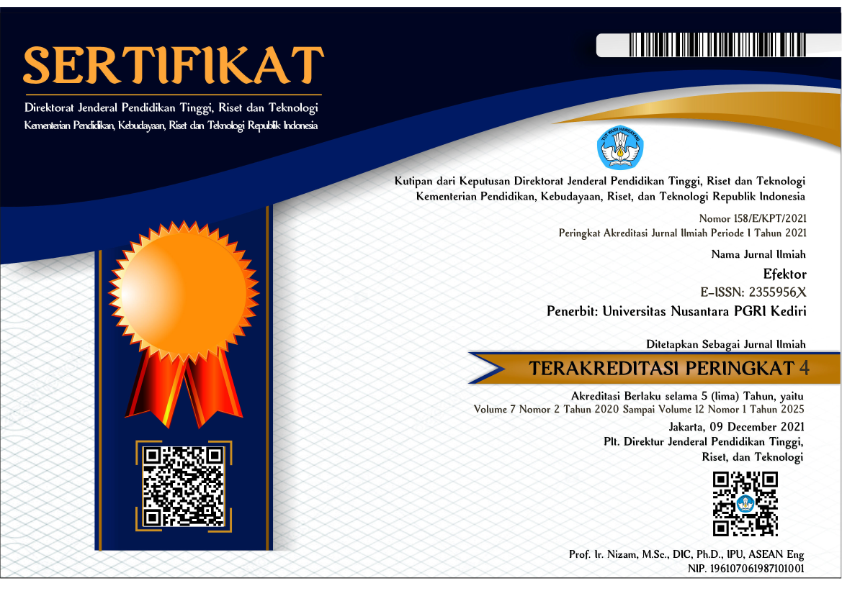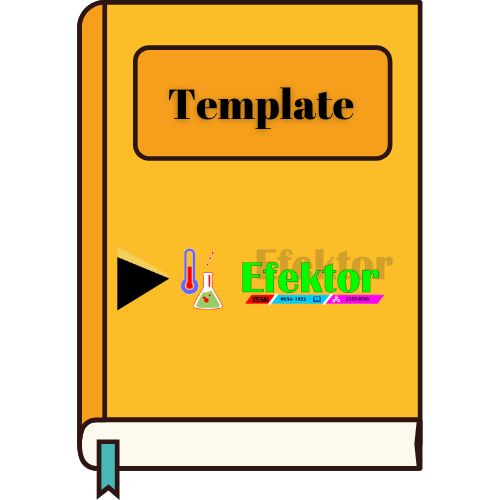Penerapan Model Pembelajaran Ekspositori Untuk Meningkatkan Motivasi, Keaktifan, Kemampuan Memecahkan Masalah, Kolaborasi, Dan Hasil Belajar Siswa Dengan Pendekatan Saintifik Berbasis Lesson Study
DOI:
https://doi.org/10.29407/e.v6i2.13754Keywords:
Expository, Scientific, Lesson StudyAbstract
Learning can be said to be effective if there is continuity between all its components, including the selection of methods, media, and appropriate learning strategies. In addition, the preparation of learning tools must also be considered in order to facilitate the learning process in the classroom, especially if the learning devices that have been prepared have gone through the process of identifying problems in the classroom and paying attention to student characteristics. The purpose of this research is to increase motivation, activeness, problem-solving skills, collaboration, and student learning outcomes through the application of expository learning models with a scientific approach based on lesson study. The method used in this research is based on a lesson study which consists of three-stage, namely: plan, do and see. From the result of research that has been done, it can be seen that the application of expository learning models with a scientific approach based on lesson study can have a positive impact on increasing motivation, activeness, problem-solving skills, collaboration, and being able to improve student learning outcomes.
References
Khotimah, R. (2016). Improving Teaching Quality and Problem Solving Ability Through Contextual Teaching and Learning in Differential Equations: a Lesson Study Approach. Online Submission, 1(1), 1–13.
Rachmawati, T. K. (2018). Pengaruh Metode Ekspositori pada Pembelajaran Matematika Dasar Mahasiswa Manajemen Pendidikan Islam. 5(2), 85–92.
Suarjo. (2016). Upaya Meningkatkan Keaktifan Dan Prestasi Berpasangan , Berbagi Pada Mata Pelajaran Pkn Di. 9(2), 261–266.
Subadi, T. (2010). Lesson Study Berbasi PTK (Penelitian Tindakan Kelas).
Sundari, F. S. (2017). Implementasi Pendekatan Saintifik Berbasis Lesson Study Terhadap Pengembangan Berpikir Kritis Mahasiswa Calon Guru Sekolah Dasar. Journal of Science Education And Practice, 1(c), 67–78.
Suprihatin, S. (2015). Upaya Guru dalam Meningkatkan Motivasi Belajar Siswa. 3(1), 73–82. Retrieved from https://energycode.pnl.gov/EnergyCodeReqs/?state=Iowa
Suyatmini. (2017). Implementasi Kurikulum 2013 pada Pelaksanaan Pembelajaran Akuntansi di Sekolah Menegah Kejuruan. 27(1), 60–68.
Utami, L. R. (2016). Pengelolaan Pembelajaran Akuntansi di SMK. Jurnal VARIDIKA, 28(1), 43. https://doi.org/10.23917/varidika.v28i1.2403
Zubaidah, S. (2018). Ketrampilan Abad ke 21: Bagaimana Membelajarkan dan Mengaksesnya. (June), 1–25.
Downloads
Published
Issue
Section
License
Authors who publish with this journal agree to the following terms:
- Copyright on any article is retained by the author(s).
- The author grants the journal, the right of first publication with the work simultaneously licensed under a Creative Commons Attribution License that allows others to share the work with an acknowledgment of the work’s authorship and initial publication in this journal.
- Authors are able to enter into separate, additional contractual arrangements for the non-exclusive distribution of the journal’s published version of the work (e.g., post it to an institutional repository or publish it in a book), with an acknowledgment of its initial publication in this journal.
- Authors are permitted and encouraged to post their work online (e.g., in institutional repositories or on their website) prior to and during the submission process, as it can lead to productive exchanges, as well as earlier and greater citation of published work.
- The article and any associated published material is distributed under the Creative Commons Attribution-ShareAlike 4.0 International License













